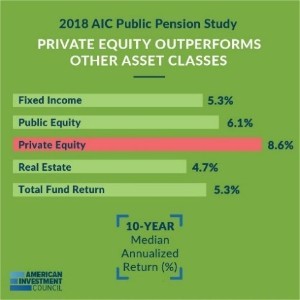Maloney, Palmer Op-ed in The Hill: “Private Equity is Investing Across Party Lines”
Today, The Hill published the following op-ed from Drew Maloney of the American Investment Council and Brett Palmer of the Small Business Investor…

Today, The Hill published the following op-ed from Drew Maloney of the American Investment Council and Brett Palmer of the Small Business Investor Alliance.

“Sauk Rapids, Minn., probably isn’t the first place people associate with private equity, but it’s one of the thousands of communities across the country where private equity investors are fueling job and economic growth.
The small city on the banks of the Mississippi River is home to Talon Innovations Corp., a manufacturer of precision machining equipment for the semiconductor industry. In 2013, private equity firm Graycliff Partners acquired the company. At the time, Talon employed 98 people.
Over the next four years, Graycliff invested more than $10 million in Talon to retrain employees, improve the company’s business model and invest in critical new infrastructure. By 2017, with the help of Graycliff, Talon boosted annual revenue from $15 million to $76 million and boasted 447 highly skilled workers.
Investments like Talon are emblematic of the industry as a whole. While many Americans think of New York or San Francisco when they think of private equity, private equity invests everywhere. And those investments make a major difference in smaller communities like Sauk Rapids. Private equity creates jobs and drives higher economic growth in communities of every size.
As presidents of the American Investment Council (AIC) and the Small Business Investor Alliance (SBIA), we work with large and small private equity firms, their portfolio companies and their investors every day. Simply put, private equity firms partner with public-pension funds, university endowments and other investors to buy companies, equip them with new technologies to compete in a changing world and grow them. After years of work and responsible management strategies, our investments help support jobs and add long-term value that benefits Americans across the country.
According to a recent AIC estimate, private equity investments support almost 5 million jobs across the country. These are good-paying jobs at companies based not just in New York or California, but in small towns like Sauk Rapids, Minnesota.

Expanding and rebuilding Main Street businesses is just one side of private equity’s business model. Public pensions are the largest investors in private equity, meaning that each successful turnaround bolsters pension returns for dedicated public servants. Earlier this year, the AIC released its annual pensions report, which found that private equity generated a 10-year median annualized return of 8.6 percent for public pensions in 2017. This far surpassed returns from other asset classes, including public equity and real estate. These returns directly help schoolteachers, police officers, first responders and other public servants secure their hard-earned retirements at a time when many states are struggling to meet obligations.
The incoming Congress is set to be one of the most ideologically and demographically diverse in history. Although progressive, conservative and moderate members may not see eye-to-eye on many issues, they all represent constituents who depend on private equity for their jobs and their retirements.
In Massachusetts, Boston City Councilwoman Ayanna Pressley will soon represent the people of the Bay State. In 2017, her district received more than $3.15 billion in private equity investment and had over 38,000 workers who are employed at private equity backed companies. Many of her constituents are also public workers who depend on the Massachusetts Pension Reserves Investment Fund (PRIT) to secure their deserved retirements. Last year, private equity investments delivered an astounding annualized 10-year return of 13.4 percent for PRIT. This is more than double what PRIT earned from public stock investments over the same period.
In Texas, conservative Chip Roy will soon represent the 21st district which stretches north of San Antonio. In 2017, this district received over $2.33 billion in private equity investment and had over 13,000 workers who are employed at private equity backed companies.
And in Illinois, Sean Casten won a tough election in the swing 6th district in suburban Chicago. This region has long been a bellwether for the national political mood, having voted for different parties in each of the last four presidential elections. In 2017, this district received more than $2.8 billion in private equity investment and had over 10,000 workers who are employed at private equity backed companies.
As two of the leading voices working to promote economic growth and the long-term success of American small businesses, the SBIA and AIC are looking forward to showing the diverse new Congress how private equity helps American businesses, workers and pension recipients in their districts.”
Drew Maloney is the President and CEO of the American Investment Council (AIC) and Brett Palmer is the President of the Small Business Investor Alliance (SBIA).


